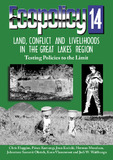Land, conflict and livelihoods in the great lakes region testing policies to the limit

View/
Date
2010Author
Huggins, Chris
Kamungi, Prisca
Kariuki, Joan
Musahara, Herman
Oketch, Johnstone Summit
Vlassenroot, Koen
Wakhungu, Judi W
Language
enMetadata
Show full item recordAbstract
This publication looks at the relationship between land tenure, land use, and
population movements, and conflict, defined here as large-scale, violent conflict.
The concepts are illustrated with case studies by the African Centre for Technology
Studies (ACTS) on Rwanda, Eastern Democratic Republic of Congo (DRC) and
Burundi.1
The relationship between land and conflict is intuitive. Historically, land has been
significant in war in the form of a ‘prize’ of territorial control enjoyed by the
victors at the expense of the vanquished – losing groups would often be forced
to flee, relinquishing their homes, fields and properties. More recently however,
increased interest in conflict analysis has revealed various complex relationships
between control over land (and land-based resources) and conflict. Combatants
involved in conflict within states – by far the most significant kind of conflict
today – often claim that unequal access to land is one of the causes of violence.
During conflict, land access is affected not just for belligerents, but for entire
communities, who become targets of violence due to the ethnicization of conflict.
And in post-conflict situations, the land and shelter needs of returning internally
displaced populations (IDPs) and refugees must be carefully managed in order to
avoid dangerous disputes and further violence.
